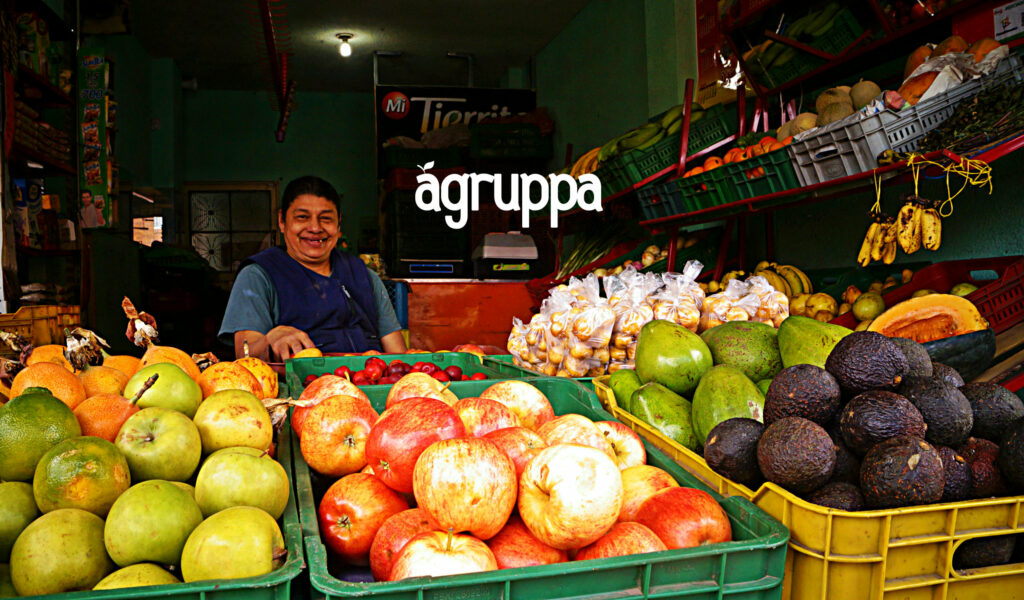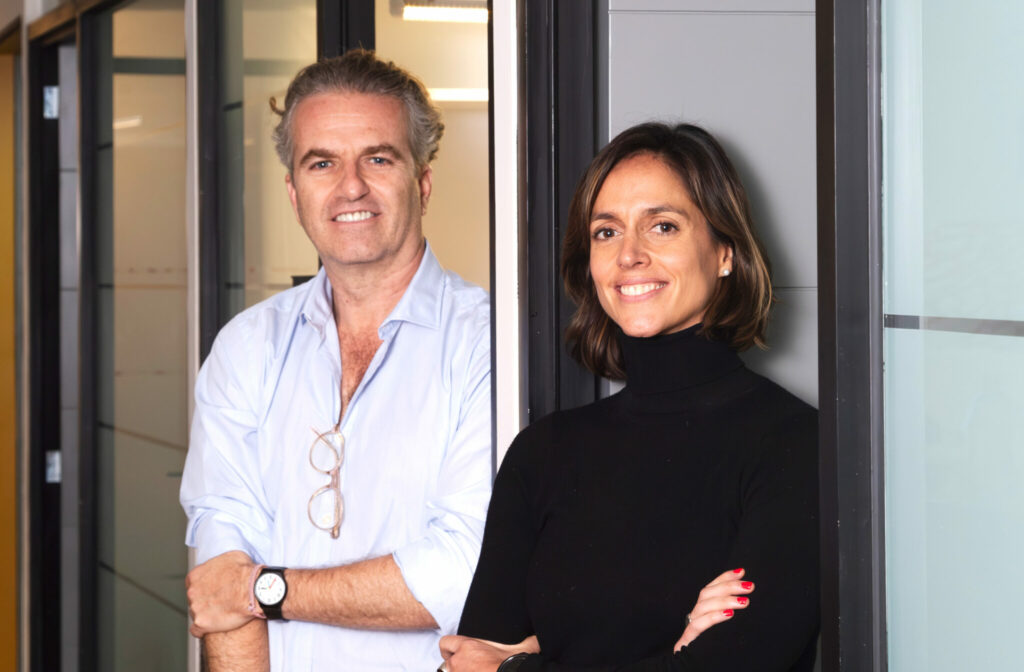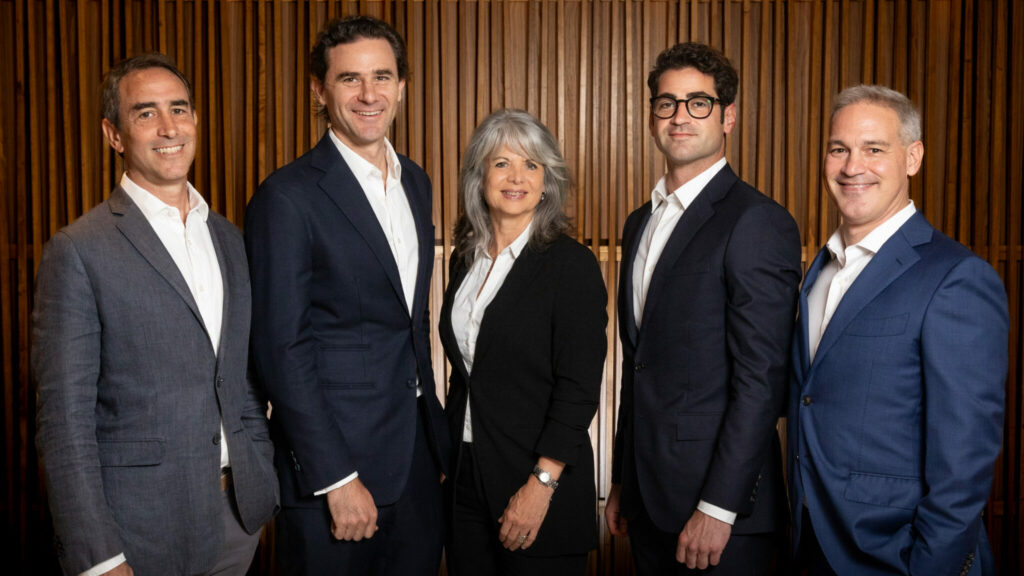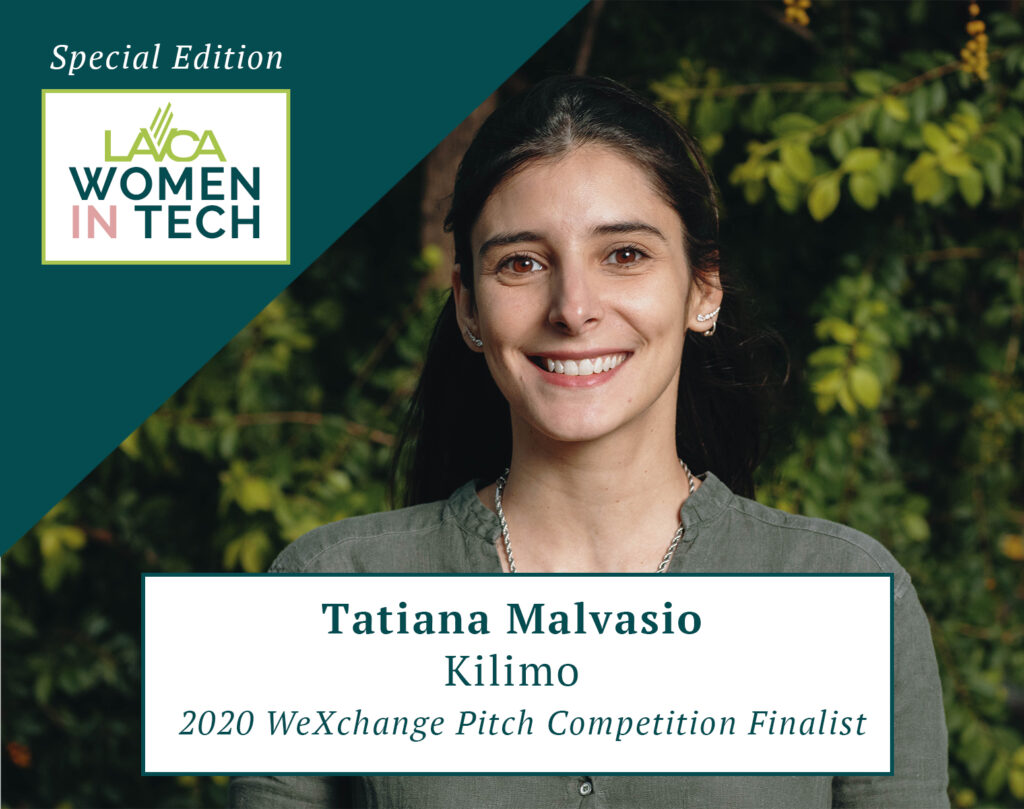Entrepreneur Profiles
Entrepreneur Profile: 2014 WeXchange Winner – Carolina Medina Gutiérrez, Co-Founder & CEO, Agruppa (formerly SokoText)
24 September 2015

LAVCA heard from Carolina Medina Gutiérrez, Co-Founder and CEO of Agruppa (formerly SokoText), to learn more about how the company uses mobile phones to reduce fresh produce prices for vendors in marginalized urban neighborhoods in Bogotá, Colombia. Carolina also discussed how winning WeXchange in December 2014 helped advance the company, as well as plans for raising a seed round in 2016. This year’s WeXchange takes place in Monterrey, Mexico on November 19-20. More information can be found here.
LAVCA: Please summarize your business
Gutiérrez: Agruppa, formerly known as SokoText, uses mobile phones to economically empower small vendors and reduce prices for fresh products in marginalized urban neighborhoods. By creating a virtual buying group among these vendors, we purchase wholesale directly from farmers, transport to the city, and deliver to our vendors’ shops. This saves them time and money spent on transportation to central markets where they buy produce, and gives them access to wholesale prices. SokoText was born through the Hult Prize social entrepreneurship competition, inspired by the challenge of food insecurity in urban slums. Two years later, after piloting in Kenya and Colombia, SokoText has split into two companies: SokoText (Kenya) and Agruppa (Colombia). In Colombia, we currently supply 29 vendors with high-quality, low-priced produce.
LAVCA: What is your background?
Gutiérrez: Before co-founding Agruppa, I studied Political Science, with minors in Economics and Social Psychology at the Universidad de los Andes in Colombia. Passionate about social development, I went on to the London School of Economics (LSE), where I obtained an MSc in International Development and Humanitarian Emergencies. Overall, I have four years of national and international experience in consultancy, market research, and social entrepreneurship and innovation, where I ideated, executed, and managed market research consultancies for enterprises and organizations like Fundación Corona, Fundes, NATO, Bavaria (SabMiller in Colombia), and Syngenta. Having found my true passion in social entrepreneurship, I’ve received recognition in the ecosystem, including being selected as one of Latin America’s Most Promising Women Entrepreneurs of Latin America and the Caribbean by the IDB.
LAVCA: Why is Colombia a good market for Agruppa? Are there plans to expand into other markets in Latin America?
Gutiérrez: Colombia is a great market for Agruppa because of three main reasons. At a customer level, there are over 340,000 mom and pop shops in the country’s main cities, counted conservatively, making it a perfect place to test, apply, and grow our business. At a higher level, the social innovation ecosystem in Colombia is among the top in Latin America, showing great growth in the past several years and opening many doors in terms of partnerships and mentors. At a personal level, it is my home country (the one I love most and know best) and my inspiration for a better tomorrow. Yet, we do have plans to expand regionally to countries like Mexico and Ecuador, where we know for a fact similar situations take place.
LAVCA: What has been the biggest challenge for getting the local community in Colombia to use Agruppa? What is your current penetration of the market?
Gutiérrez: The main challenge for getting small mom and pop shop vendors to use Agruppa in Colombia is breaking their existing working practices. That is, getting them to buy from us and not from the local central markets where they have always purchased produce. It only takes one purchase to get them to use our service, though, as they quickly realize we are trustworthy and supply at a high quality and low price. We are currently restarting operations with 29 vendors in Bogotá, Colombia, but are slowly building up to 300 vendors, our goal for the end of 2016 (around 0.5% market penetration).
LAVCA: Agruppa (at the time SokoText) won the WeXchange competition in December 2014. How did this help advance the business?
Gutiérrez: Participating and winning the WeXChamge competition last December was a great opportunity both at a personal and business level. Personally, I really appreciated getting to know other extraordinary Latin-American women who are also giving their all to make their businesses and dreams a reality. It was a great platform to meet high level role-models, like Linda Rottenberg, Rania Anderson, and Anne Ravanona. Furthermore, once back home, WeXChange, through the NxtpLabs community, opened doors to several mentors that helped guide us through difficult questions and decision-making processes. It also facilitated access to potential investors who we still keep in touch with and will potentially work with in 2016.
LAVCA: What specific challenges do you face being a Women entrepreneur in Latin America?
Gutiérrez: Being a woman entrepreneur in Latin America can definitely have its challenges, especially in a mostly-men-led sector. Verena (my co-founder) and I have difficulties negotiating fair prices at farms and central markets because we are women. This is usually a job done by men, so we get penalized with higher prices for our “naivety” as women. Also at the vendor level our customers don’t necessarily believe that two women can bring high-quality, low-priced produce to their shops, as we claim we can. However, being a woman also has multiple up-sides. Whatever people find unusual, tends to catch their attention. Hence, Agruppa also has the potential (and often does) catch people’s eye! And once we prove we can deliver what we promise, we often find that people trust us even more.
LAVCA: What financing have you received thus far? From whom and at what point? What resources have you used in your search for financing? Are you currently looking for additional financing?
Gutiérrez: We have received funding from two sources. First, we received a grant from Postobón (PepsiCo in Colombia) in May 2015. Second, we got a contract from a large International Organization (not public yet) which we will receive as of November 2015. Both funds came thanks to the market-proof we achieved during October 2014, when we piloted with 10 vendors, as well as through the continuous market research we carried out during the first semester of 2015 to show the growth potential of Agruppa in Bogotá. To achieve this, we mainly put to work our grant and application writing expertise, as well as networking to find the right grants for to meet our goals. We are going to open our seed round during the first semester of 2016, to expand our presence in Bogotá.
LAVCA: How have you/do you plan to use the financing? In general, how do you plan to grow the business?
Gutiérrez: We are going to use the financing mostly for working capital in order to operate at a small scale in Bogotá. This basically means buying produce; paying for transportation, both from the farm to the city, as well as from our Outlet in the city to our vendors’ shops; and paying for the facilities and personnel that allows our operations to run smoothly. We will additionally invest in technology development (creating our app and IVR systems, and enabling our software in Colombia); social impact monitoring and evaluation; and buying trucks to optimize our costs. We will grow our business by Outlets. One Outlet can supply up to 300 vendors, so we allocate vendors to our nearest Outlet and create new Outlets as we geographically expand.
LAVCA: In your experience, what are the biggest opportunities and challenges for creating and growing a business in Latin America?
The biggest opportunity for creating a business in Latin America is the great space there is to innovate and/or replicate innovative ideas that have been implemented somewhere else. Our region welcomes new or successful business ideas, especially those who can create shared value or opportunities for the most vulnerable. The biggest challenge is funding at an early stage. Given the history and current situation in our region, investors are still very risk-averse. In this sense, there is an investment gap between those who fund pure ideas and those who fund startups with a proven track record.
LAVCA: Do you have any advice for women hoping to create and grow a business in Latin America?
We live in a region that welcomes innovation and entrepreneurship. I have three pieces of advice for women hoping to create and grow a business in Latin America. First, trust in yourselves! There is no job a woman can’t get done, no matter what anyone says! Second, work very hard to understand your customers and market segment, making sure that your product or service does satisfy their needs and fulfills their dreams. Finally, and most importantly, find a way to wake up every day loving what you do, because as there are ups, there will be downs, and only the passion and true belief in what you do will keep you going through it all.
You may be interested in...
-

Is AI a Thing in Latin America? In Conversation with Hi Ventures
LAVCA sits down with Hi Venture to discuss their evolving thesis and vision for...
-

The Future of B2B Startup Investing in LatAm: In Conversation with NXTP
NXTP Ventures recently reached a USD98m final close for NXTP Fund III, its third...
-

A 20-Year Journey: An Interview with Technisys CEO Miguel Santos
Company: Technisys Investors: KASZEK, Dalus Capital, Riverwood Capital Interview...
-

Satellite Analytics & Irrigation Systems: Interview with Kilimo COO Tatiana Malvasio
Company: Kilimo Investors: NXTP Ventures, Alaya Capital, The Yield Lab, Xpand...
